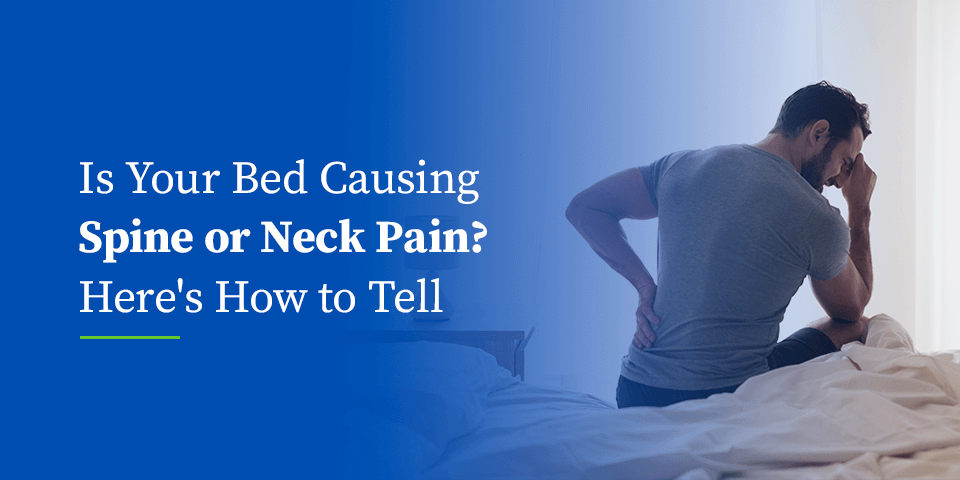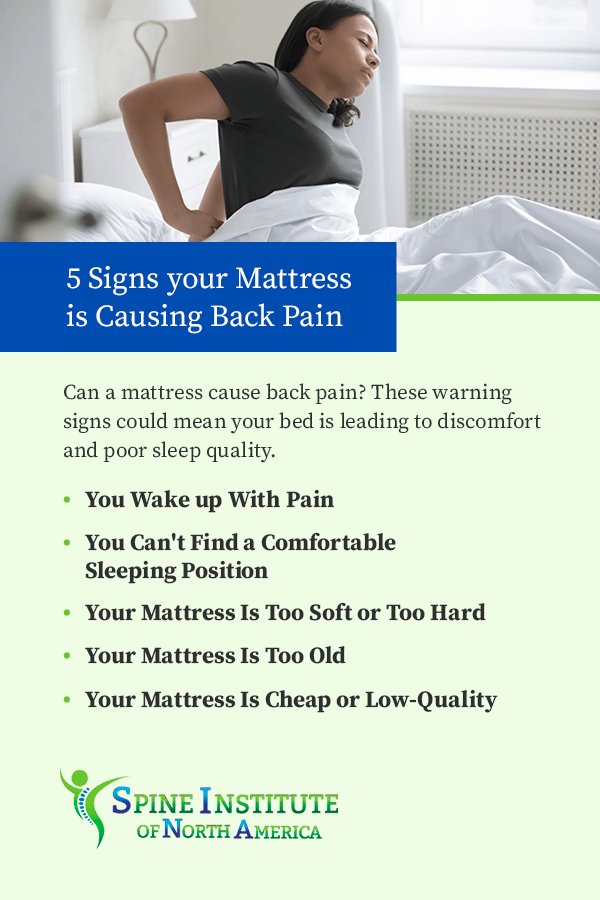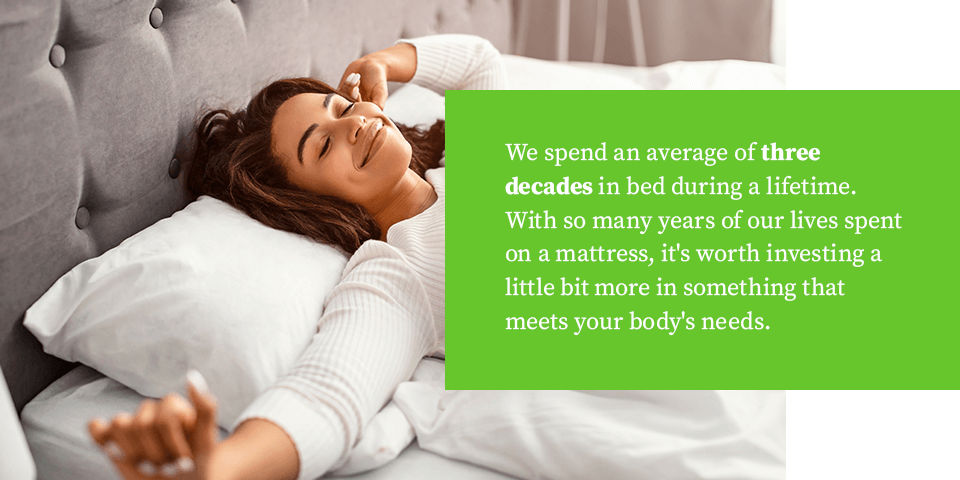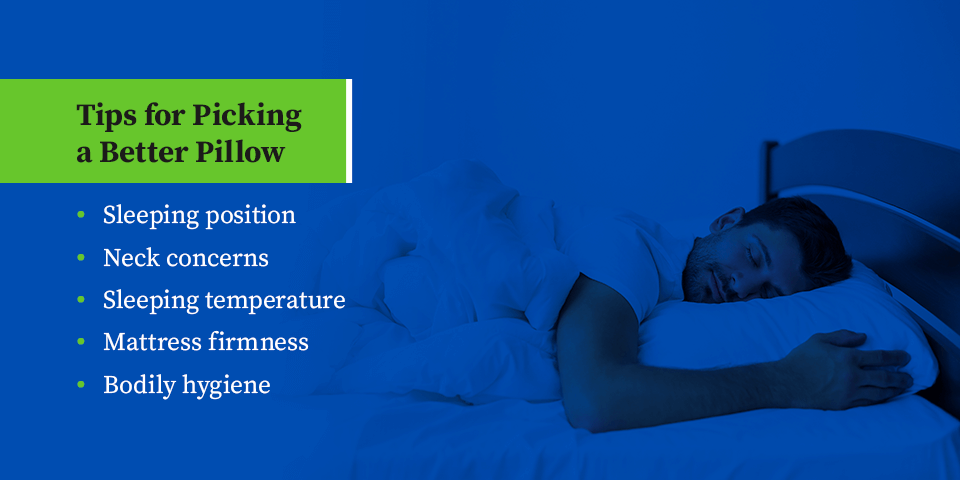If you’re suffering from unexplained neck or back pain, your bed could be to blame. Just like comfortable, custom-picked mattresses can help you wake up energized and ready to take on the day ahead, worn or incompatible mattresses can leave you unrested and sore in the morning.
In addition to daily aches and pains, poor-quality sleep can cause:
- Loss of productivity
- Decreased ability to manage tasks
- Slowed vigilance, alertness and reaction times
- Decreased short-term memory
- Mood disorders, such as depression
- Work-related safety incidents
5 Signs Your Mattress Is Causing Back Pain
Can a mattress cause back pain? These warning signs could mean your bed is leading to discomfort and poor sleep quality.
1. You Wake up With Pain
Nearly two out of five American adults feel back pain, making it one of the most common pain types in the United States. Though women and older adults are more susceptible to these aches, all children and adults could be at risk, depending on the source.
If your bed is to blame for your back pain, you’ll likely start feeling it upon waking up or getting out of bed. It may feel like a centralized pain point or a more generalized, dull ache. While some sleep-related pain could be due to your sleep position or the previous day’s activities, it’s time to evaluate your sleeping arrangements if the pain lingers or worsens throughout each day.
2. You Can’t Find a Comfortable Sleeping Position
Tossing, turning, flipping the pillows — we’ve all had those nights where we have trouble winding down and falling into a relaxing sleep. If this has become your nightly routine, your bed could be at fault.
Remember to rotate your mattress at least once per year, depending on the type you have, to manage weight distribution and reduce lumps and discomfort.
3. Your Mattress Is Too Soft or Too Hard
Mattresses range in firmness, and experts typically recommend medium to hard support. Because each body is different, you might find yourself more comfortable and supported with one of the following.
- Soft: Soft mattresses have thick, plush cushioning that sinks when you sit or sleep on them. The conforming comfort of a soft mattress is a good fit for lightweight side sleepers but never sacrifice adequate spinal support for softness.
- Medium: Medium mattresses range from medium-soft to medium-hard with several variants. They are usually a good fit for versatile sleepers, including side, back and stomach sleepers, and people with different body types.
- Hard: Hard mattresses offer firm support for back and stomach sleepers, plus heavier people. These beds have little to no shrinkage.
Extra-soft and extra-hard mattresses also exist for specific sleeping situations and physical needs but aren’t generally necessary for the average sleeper.
4. Your Mattress Is Too Old
You should replace your mattress every six to eight years or as needed depending on your specific sleeping conditions. Consult the manufacturer’s label if you’re not sure how old your mattress is. If your mattress is newer and doesn’t meet this threshold — but is still uncomfortable — try to find a replacement as soon as possible.
5. Your Mattress Is Cheap or Low-Quality
We spend an average of three decades in bed during a single lifetime. With so many years of our lives spent on a mattress, it’s worth investing a little bit more in something that meets your body’s needs.
Today’s mattress market is more versatile than ever, with your choice between in-store purchases, online bed-in-a-box deliveries and more access to unbiased reviews and sleep research than ever before.
If your bed is causing body pain and it’s time to get something better and potentially more expensive, many retailers have flexible financing options and money-back guarantees after a trial run sleeping on them.
What You Can Do to Relieve Your Pain
By the time you realize a bad mattress can cause back pain and is probably responsible for various body aches, some damage has already occurred. Your muscles and joints are tired, your spine is unsupported and your body is stiff. Depending on how long you’ve been dealing with these symptoms, you might also have sleeplessness and daily fatigue.
Arm yourself with the following tips and knowledge to remediate body aches and position yourself for better sleep with a new bed.
Know What’s in Your Mattress
If you’re shopping for a new bed because your current one isn’t supportive of your body type and sleeping position, you should first know what type you’ve been sleeping on and what other options are available.
The most popular options on the market today include the following.
- Foam: Memory and gel foam mattresses can be a great fit for couples valuing motion isolation or individuals looking for soft support and a body contouring surface. Sleepers who get hot overnight or live in warmer climates may not prefer the way a foam bed traps heat, and some spinal conditions or sleeping positions lend themselves better to firmer toppers. Stick to mattresses made with safe, nontoxic foams while shopping.
- Springs: Spring mattresses are a classic choice, but they are far from outdated on today’s market. They offer firmer support with spring-backed bounce, and they don’t trap heat the same way foam beds do. These beds do not isolate movement and start to sag over time or after excessive wear.
- Hybrid: Hybrid mattresses combine different foams, springs and layering techniques to create unique mattresses that target different types of sleepers, including individuals and couples who might sleep in separate positions or had opposite body compositions.
Pick out a Mattress You Like
The best way to know if a bed offers enough support is to test it before taking it home. Mattress stores will let you feel, sit and lie on floor models for a better idea of what to expect. Online mattresses typically come with a risk-free trial period.
When testing your mattress, choose a supportive position. Your head and neck should be flat and aligned with your spine as much as possible.
Some individual factors that could affect how much you enjoy a mattress include:
- Your body height and weight.
- Your average sleeping temperature.
- Existing physical or mobility limitations.
- Existing pain, like pulled muscles or arthritis.
- Sleep disorders, like sleep apnea.
- Specific health conditions, like GERD.
- Others sharing the bed, like pets or partners.
Find a Mattress With Back Support
The ideal mattress for you is a balance of comfort and support, especially near your lower back. Know the difference between bed firmness and bed support to find the best sleeping arrangements for you.
- Firmness: Mattress firmness is the way a bed feels when you first sit or lie on it. Factors contributing to firmness include pillow-top plushness and foam contouring.
- Support: Mattress support is how well the entire bed supports your spinal alignment, sleeping position and body type.
Know When to Replace an Old Mattress
Is it time to replace your bed? Consider the following.
- Age: Replace older mattresses as often as needed, typically once per decade. You should also consider the age of bed supports, like bed frames, box springs, pillows and bedding.
- Quality: Whether your mattress quality is contributing to back pain or isn’t as comfortable as it could be, bed and sleep quality are the best way to know when it’s time to replace your bed.
- Size: If you need a larger or smaller mattress, this is the perfect time to upgrade to a better-quality bed suited to your circumstances.
- Lifestyle: As your lifestyle changes, your bed requirements will need adjusting. Weight fluctuations, new partners, pets who share the bed and different sleeping climates can all affect the way your bed and body interact and your resulting sleep quality.
Start Stretching
Stretching before and after bed is a great way to stay in touch with how you’re feeling and flexing pressure and pain points on your body.
Incorporate regular stretching, such as yoga or gentle spinal movements, into your night and morning routines for better sleep and a more flexible, adaptable body.
Your Pillow Could Also Be a Problem
If your mattress is comfortable, but you still have unexplained neck or spinal pain, your pillow could also be at fault. Your pillow should be soft and plush enough for a relaxing rest but supportive enough to keep your neck aligned throughout the night. Avoid stacking multiple pillows or elevating your neck too far above your back and spine.
Tips for Picking a Better Pillow
Upgrading your pillow can make a world of difference in your sleep quality and how rested you feel the next day. Follow these tips when picking a replacement for your bed.
- Sleeping position: Stomach sleepers’ faces point toward the mattress, typically turned extremely to one side or the other. Back sleepers whose spines might be flat on the bed may have an elevated neck from their pillow type or placement. Side sleepers usually have the best spinal alignment when their legs are slightly curved. Shop for pillows thin enough to keep your spine in a fluid line in whatever position you most often sleep in.
- Neck concerns: Contoured pillows that cradle your neck and head might be a good option if you suffer from neck pain.
- Sleeping temperature: If you’re prone to overheating in your sleep, look for pillows made with cooling foam or gel inserts with cases made of cooling fabric.
- Mattress firmness: Firmer mattresses often require thicker pillows to accommodate the distance between your shoulders and lack of sinkage when you lie down. Softer beds need thinner pillows to sink down into the bedding with your body weight and maintain alignment.
- Bodily hygiene: Some people prefer specific pillowcases or types for hygienic or beauty reasons. For example, silk pillowcases are gentler on fragile or breakage-prone hair. Wash and replace all pillowcases as needed to keep skin clear and maintain consistent neck support.
If you replace your mattress and pillows simultaneously and your pain persists or worsens, it will be challenging trying to determine which one needs further adjustments. Replace one at a time and give your body ample time to adjust before moving on to other replacements.
Seeking Treatment
Contact your doctor right away if your back or neck pain is new or comes on suddenly. Monitor yourself for signs of headache, tingling sensations and weakness, and see a professional if your pain spreads to other areas of your body. If your symptoms worsen or persist despite changing your mattress and pillow, schedule an appointment to discuss further options, such as:
- At-home exercise programs or fitness plans
- Pain counseling
- Physical therapy
- Pain-management techniques or medical intervention
- Injury prevention education
- Additional testing to rule out other potential pain causes
- Spinal realignment or adjustment
Always see a doctor if your pain is severe enough to cause distress or interrupt your daily life, even if you’re in the process of adjusting your bed to meet your lifestyle. A doctor or spinal professional can help alleviate your symptoms and give you specific insight into your body’s unique needs when shopping for a replacement mattress or pillow.
Contact Spine INA Today
Neck and back pain that lasts throughout the day can cause bothersome or debilitating symptoms, including fatigue, mood changes, chronic soreness, trouble concentrating and more. Regularly monitor and adjust your sleeping arrangements as your lifestyle changes to maintain your spinal health and alignment.
Replace your mattress as it ages or becomes incompatible with your specific body needs, and invest in one made from high-quality, comfortable materials that support and comfort your frame. Choose pillows to accommodate your sleeping position, weight and personal preferences.
Reach out to a professional to schedule an appointment and get relief for your neck and back pain. At the Spine INA, our board-certified specialists will work alongside you to determine what’s causing your pain, provide education for avoiding future soreness and assist with condition-specific treatment to alleviate your symptoms and correct misalignment.
Sleep is a critical part of living a long, happy and healthy life — don’t settle for an uncomfortable bed and morning soreness. Relieve your pain and revive your life by scheduling an appointment with one of our professionals today.













